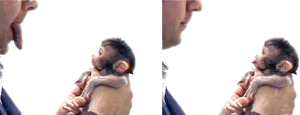Monkey see, monkey do
Monkey see, monkey do is a pidgin-style saying that appeared in American culture in the early 1920s. The saying refers to the learning of a process without an understanding of why it works. Another definition implies the act of imitation, usually with limited knowledge and/or concern for the consequences.
The saying could originate from a story in the folklore of Mali, West Africa, made well known by Esphyr Slobodkina's retelling, which she calls Caps for Sale (A Tale of a Peddler, Some Monkeys and Their Monkey Business).[1] This folk-tale is retold by Baba Wagué Diakité in his 1999 book The Hatseller and the Monkeys, set in Mali. Diakité notes that versions of this tale also exist in Egypt, Sudan, India, and England.[1]
Jazz singer-songwriter Michael Franks used the saying as the subject and title of his song "Monkey See – Monkey Do" on his 1976 album "The Art of Tea". A television show of the same name aired on PBS Kids Sprout. The phrase is also mentioned in Nirvana's song "Stay Away" from their album Nevermind.
This same saying was used by Terence Trent D'Arby in the song "Wishing Well" and by Beth Orton in her Song "Galaxy of Emptiness" .
The phrase is also pastiched in Planet of the Apes (1968), inverted into "Human see, human do".

Example
When in Rome, do as the Romans do is a proverb attributed to Saint Augustine. The phrase means that it is advisable to follow the conventions of the area in which you are residing or visiting.
See also
References
- Whitman, Neal (November 25, 2013). "Why Do We Say "Monkey See, Monkey Do"?". The Visual Thesaurus. Retrieved 2014-09-26.